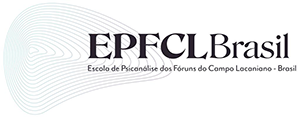What do the analysts tell us in the pass?
DOI:
https://doi.org/10.31683/stylus.v0i36.251Keywords:
xxxAbstract
The article discusses the device of the pass and its transmission in the School. The termination of an analysis has to do with a decision. But who decides? It is not the analyst, nor the analysand, it is an acephalous decision, it does not depend on the will. It is a moment to conclude, typical of an analytical process that “takes” both the analysand and the analyst. It leads us to think about the complex issue of authorization: In the demand of the pass to the School, the analysand no longer authorizes themselves by the analyst, but rather takes on the task of accounting for the Other, no longer supports the analysand-analyst pair, but instead the analyst-School pair. The pass is an invitation to the analyst to offer their transmission experience. It no longer appears the coaptation of superiors, but of equals, passers, who are also psychoanalysands and are part of the process. The pass is the ability to convey what you discovered in your analysis to others and commit to a new experience in the collective, the School.
Downloads
References
- FREUD, S. (1913) “Sobre la iniciación del tratamiento”. En Obras Completas, Buenos Aires, Amorrortu editores, 1993, XII,
- FARIAS; F. El síntoma al final del análisis. En Memorias de la XII Jornadas de Investigación, UBA, Facultad de Psicología, 2004
- LACAN, J. y otros “El atolondrado, el atolondradicho o las vueltas dichas”. En Escansión , Buenos Aires, Paidós,1984, 15-69
- LACAN, J. y otros “Proposición del 9 de octubre de 1967 sobre el psicoanalista de la escuela”. En Momentos cruciales de la experiencia analítica”Buenos Aires, Manantial, 1991
- LACAN, J. “Nota Italiana” El Pase a la Entrada” Fascículos de psicoanálisis. Eolia, 1992
- LACAN; J. Libro15. El acto psicoanalítico. Inédito.
- LACAN, J. (1975) Seminario 23 “El Sinthome” , Buenos Aires, Paidós, 2006
- LACAn, J. “Discurso pronunciado por Lacan el 6 de dicembre de 1967 en la EFP
- LACAN, J. La Tercera.En Intervenciones y Textos II, Buenos Aires, Manantial, 1988
- LACAN, J.Psicoanálisis, Radiofonía y Televisión. Barcelona: Anagrama, 1977.
- Lacan, J.Introducción a la Edición Alemana. Revista Mundial de Psicoanálisis Uno por Uno 42 Barcelona, Buenos Aires: Eolia.
- LÓPEZ, H: Lo fundamental de Heidegger en Lacan, Buenos Aires, Letra Viva, 2004
- SOLER, C. Finales de análisis, Buenos Aires, Manantial, 1988
- SOLER, C. ¿Qué Psicoanálisis? Buenos Aires, Editorial EOL, 1996
- SOLER, C. “La destitución subjetiva” Seminario dictado en Foro Psicoanalítico de Buenos Aires, Inédito, 2002Escuela”.
- AUTORES VARIOS : “Enseñanzas del Pase”. Colección Orientación Lacaniana. Ed EOL.
- AUTORES VARIOS “¿Cómo terminan los análisis? Ed. EOL
Published
How to Cite
Issue
Section
License
Ao encaminhar os originais, os autores cedem os direitos de publicação para STYLUS.
Os autores assumem toda responsabilidade sobre o conteúdo do trabalho, incluindo as devidas e necessárias autorizações para divulgação de dados coletados e resultados obtidos, isentando a Revista de toda e qualquer responsabilidade neste sentido.



